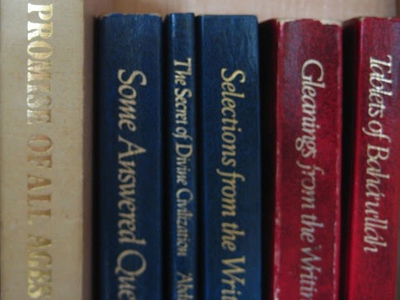

© bahainafeza.wordpress.com
The Bahá’í Writings
The writings of Bahá’u’lláh comprise about 100 volumes, including books such as the Kitáb-i-Aqdas (the Most Holy Book) and many thousands of letters or ‘tablets’ to individuals. Bahá’u’lláh’s son, ‘Abdu’l-Bahá, also wrote several books and letters, and many of his talks and conversations have been written down. ‘Abdu’l-Bahá’s writings, as well as those of his father, are regarded by Bahá’ís as scripture. They are read at Bahá’í meetings and in the Houses of Worship, alongside the sacred texts of other religions. ‘Abdu’l-Bahá’s successor, Shoghi Effendi, translated many of the texts of the Báb, Bahá’u’lláh and ‘Abdu’l-Bahá into English. Shoghi Effendi also wrote a book of Bahá’í history, and many of his letters have been collected together in book form.
During his exile in Istanbul, Edirne and Akka, Bahá’u’lláh wrote letters to several religious and secular leaders, including Pope Pius IX and many of the heads of state of the leading Middle Eastern and Western powers. He put forward his claim to be the representative of God on earth, and called on the monarchs and religious leaders of the world to abandon their arms race and make moves towards peace. These letters are known collectively as The Proclamation of Bahá’u’lláh.
Bahá’u’lláh wrote two mystical treatises, The Seven Valleys and The Four Valleys, after encountering which group of people during his stay in Kurdistan in 1854-6?
Bahá’u’lláh wrote these works for two prominent Sufis. The Seven Valleys describes the journey of the soul as it progresses through seven stages towards the object of its existence. The Four Valleys describes four modes of progress for the soul.
Ready for more?
not all...
quizzers. Try to win a coveted spot on our Hall of Fame Page.






